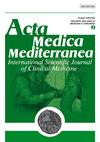COVID-19 Fear and Anxiety in Patients with Diabetes Mellitus and their Effect on HbA1c
IF 0.3
4区 医学
Q4 Medicine
引用次数: 0
Abstract
Objective: To determine the severity of fear and anxiety of COVID-19 in diabetic patients and to evaluate their relationship with HbA1c. Materials and methods: Between December 2020 and March 2021, a total of 249 patients were included in the study. Demographic characteristics, duration of diabetes, glycosylated hemoglobin A1c (HbA1c) values of the patients were recorded. Fear and anxiety related to COVID-19 were evaluated with the validated Turkish version of the Fear of COVID Scale (FCS) and Coronavirus Anxiety Scale (CAS). FCS and CAS were compared between the diabetic group and the control group. The relationship between FCS and CAS and HbA1c, diabetes year, age, gender, educational status, place of residence, and employment status was investigated. Results: Median level of HbA1c and duration of diabetes mellitus were 7.65% (range 5.4-13.6) and 10 years (range 1-32) respectively. FCS was higher in the diabetic group compared to the control group (p=0.025). There was no significant difference between the diabetic and control groups regarding CAS. There was no relationship between HbA1c and FCS and CAS (p=0.919, r=0.008, p=0.725, r=0.027, respectively). Anxiety was higher in females than males in diabetic groups (p=0.009). Conclusions: The fear of COVID-19 is higher in diabetic patients compared to the general population. There was no relationship between fear and anxiety of COVID-19 and HbA1c. However, to protect long-term mental health, there should be strategies to detect and reduce the anxiety and fear caused by the pandemic in the services for diabetic patients.糖尿病患者COVID-19恐惧和焦虑及其对HbA1c的影响
目的:了解糖尿病患者COVID-19恐惧和焦虑的严重程度,并评价其与HbA1c的关系。材料与方法:2020年12月至2021年3月,共纳入249例患者。记录患者的人口学特征、糖尿病病程、糖化血红蛋白(HbA1c)值。使用经过验证的土耳其版COVID-19恐惧量表(FCS)和冠状病毒焦虑量表(CAS)评估与COVID-19相关的恐惧和焦虑。比较糖尿病组与对照组的FCS和CAS。研究FCS和CAS与HbA1c、糖尿病发病年份、年龄、性别、文化程度、居住地、就业状况的关系。结果:HbA1c的中位水平和糖尿病病程分别为7.65%(范围5.4-13.6)和10年(范围1-32)。糖尿病组FCS高于对照组(p=0.025)。糖尿病组与对照组在CAS方面无显著差异。HbA1c与FCS、CAS无相关性(p=0.919, r=0.008, p=0.725, r=0.027)。糖尿病患者女性焦虑程度高于男性(p=0.009)。结论:糖尿病患者对COVID-19的恐惧高于普通人群。对COVID-19的恐惧和焦虑与HbA1c没有关系。然而,为了保护长期的心理健康,应该制定战略,在为糖尿病患者提供服务的过程中发现并减少这种流行病造成的焦虑和恐惧。
本文章由计算机程序翻译,如有差异,请以英文原文为准。
求助全文
约1分钟内获得全文
求助全文
来源期刊

Acta Medica Mediterranea
医学-医学:内科
自引率
0.00%
发文量
0
审稿时长
6-12 weeks
期刊介绍:
Acta Medica Mediterranea is an indipendent, international, English-language, peer-reviewed journal, online and open-access, designed for internists and phisicians.
The journal publishes a variety of manuscript types, including review articles, original research, case reports and letters to the editor.
 求助内容:
求助内容: 应助结果提醒方式:
应助结果提醒方式:


